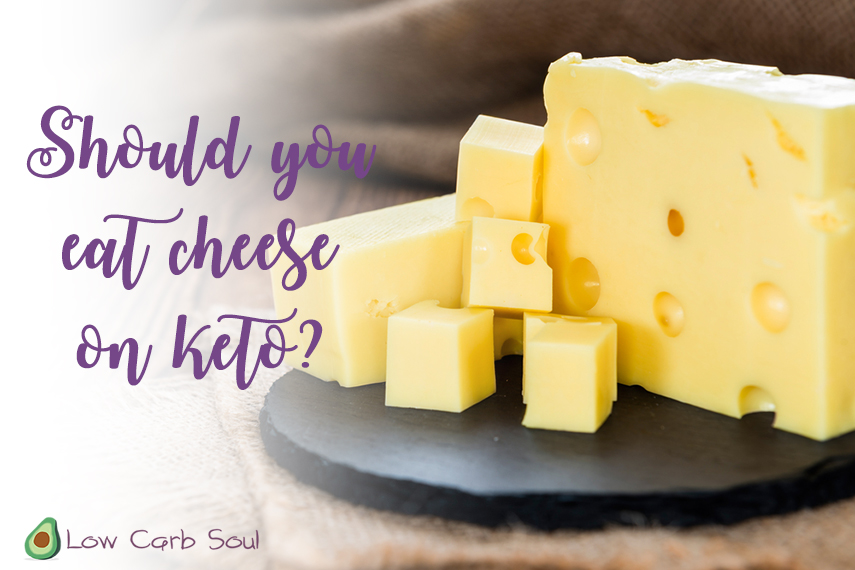Should you eat cheese on keto?
When I was first starting out on my ketogenic diet, one of the things I noticed was that a lot of keto blogs relied heavily on cheese in their recipes. It makes sense: cheese is low in carbs and high in fat, so it seems like the ideal keto food. But unfortunately, cheese and other dairy products aren’t as healthy as we’ve been led to believe.
I ate a lot of cheese just to help me get through my keto adaptation phase, but now I’ve mostly eliminated it from my diet again. Whether you’re keto or not, I don’t recommend making cheese a major part of your diet. Here’s why.
Dairy and inflammation
Dairy is one of the biggest contributing factors to systemic internal inflammation, which has been linked to every major chronic degenerative disease. If you’re on a ketogenic diet and you aren’t getting the results you want, or you’re stuck at a weight-loss plateau, inflammation could be the culprit. Taking the next step to eliminate dairy from your diet could help you get over the hump. Learn more about chronic inflammation and how to combat it.
Dairy and acid formation
Dairy, along with many of the foods we eat on a daily basis, is an acid-forming food. The body’s natural pH should be slightly alkaline, but foods such as sugar, meat, dairy, coffee, and refined grains make the body more acidic, which many health experts believe is a contributing factor in chronic illnesses, including cancer, heart disease, diabetes, and osteoporosis.
When there is too much acid in the bloodstream, the body will compensate by pulling minerals out of bones, including calcium, in order to balance the body’s pH. This process, known as bone resorption, weakens the bones and contributes to the high rate of osteoporosis observed in the western world.
It makes me crazy to see most mainstream nutrition sources recommending dairy to prevent osteoporosis. Studies have shown that countries with the most dairy in their diets also have the highest rates of osteoporosis, and yet we continue to push the idea that dairy is healthy. You don’t need dairy to build healthy bones. In fact, calcium may not even be the magic bullet it’s been made out to be. Studies show that in regions such as Asia and Africa — where people consume little dairy and don’t supplement with calcium — bone fracture rates are 50 to 70 percent lower than in the US. Studies also show that eating a diet high in fruits and vegetables improves bone density. It’s not that calcium isn’t an important mineral, but it isn’t the only component in bone health. Eating a diet low in acid-forming foods and high in alkaline foods may be a bigger factor.
An alkaline diet is high in fruits and vegetables, low in refined grains, and moderate in protein, so it’s perfectly compatible with keto. Some foods that are highly alkaline include broccoli, avocados, cabbage, celery, cucumber, garlic, kale, and spinach — all of which are perfectly acceptable and encouraged on a ketogenic diet.
Dairy intolerance and allergic reactions
Dairy also simply doesn’t work for a lot of people. Approximately 65-75 percent of the world’s population is lactose intolerant, meaning they are deficient in the enzyme lactase, which is needed to digest the sugar in milk. The highest rates of lactose intolerance occur in people of African, East Asian, and Native American descent.
Many other people are sensitive to dairy and may not even realize it. Negative reactions to dairy include acne, sinusitis, headaches, fatigue, joint pain, digestive issues, and eczema. If you suffer from any of these ailments, try eliminating dairy from your diet and see if your condition improves. I mentioned this in my post about inflammation, but it bears repeating: if you’ve eaten dairy your entire life, and you’ve suffered from acne / digestive problems / sinus issues / whatever your entire life, you may not realize the two are related until you cut dairy out of your diet.
For me, it’s sinus issues. I can definitely tell a difference when I cut back on dairy. Sometimes after I eat it, I can literally feel my head growing heavy as my sinuses get more congested.
A final note on dairy
If that all isn’t enough to make you reconsider dairy, think about this: Humans are the only species to drink milk past infancy, and to drink the milk of another animal. Milk has a specific purpose: to build bones and muscles during infancy. Human babies can’t digest cow’s milk, because cow’s milk is made for baby cows, who have very different nutritional needs. Why then do we continue to insist that cow’s milk is a healthy food for adult humans?
If cheese is a big part of your diet, I recommend eliminating it from your diet and see what kind of results you notice. If you find that you are sensitive to dairy, save it for an occasional meal or a special treat rather than eating it every day, or work on eliminating it from your diet entirely.
Tags In
Karen
Leave a Reply Cancel reply
Categories
- Holistic Health (3)
- Ketogenic diet (4)
- Meal Planning (3)
- Nutrition (1)
- Recipes (2)
- Weight Loss (2)



